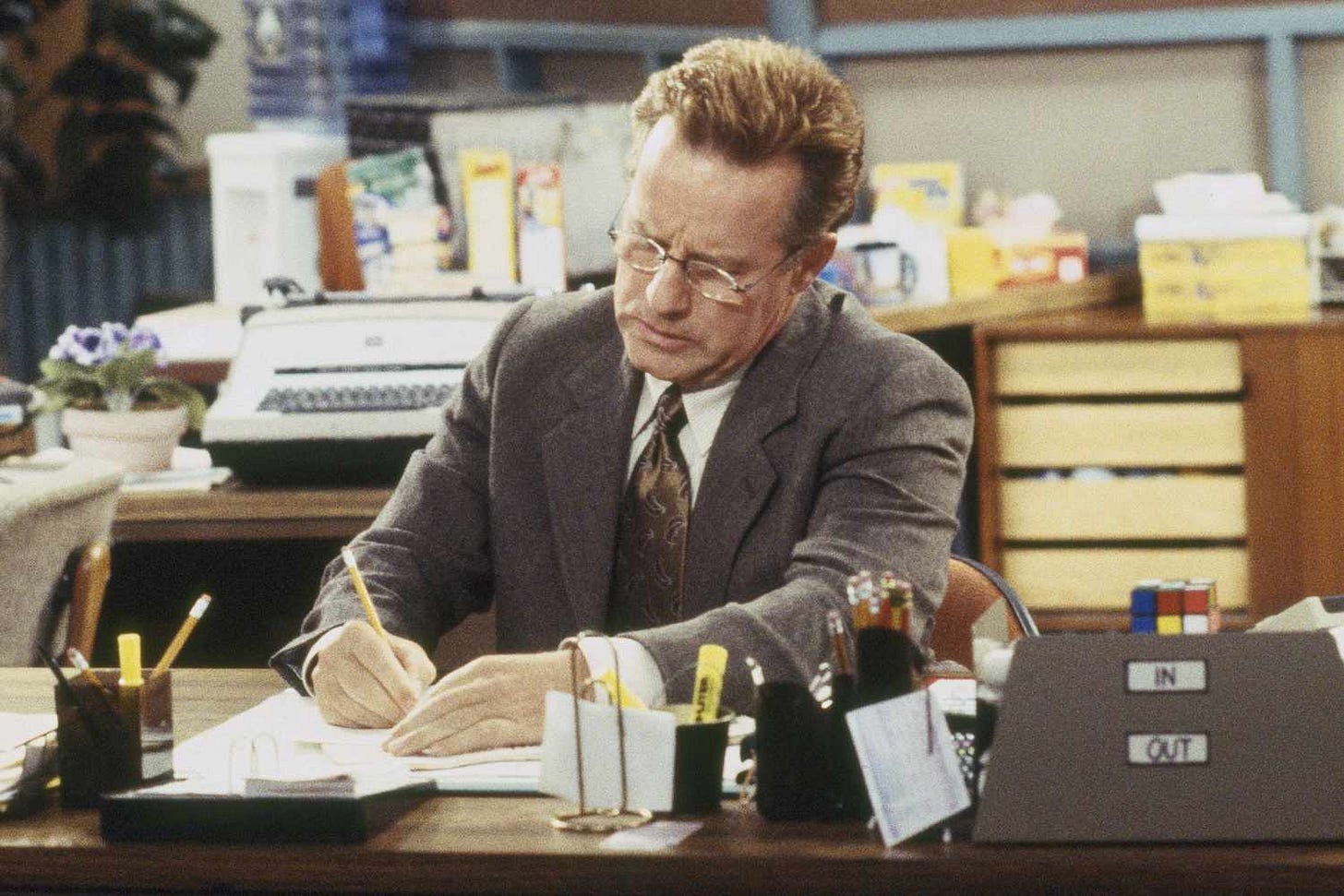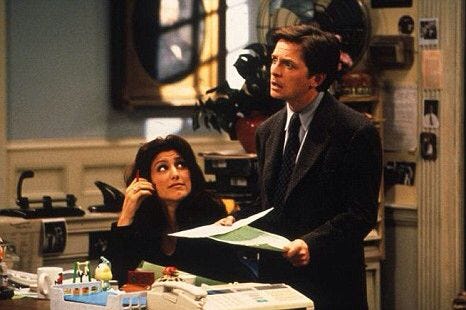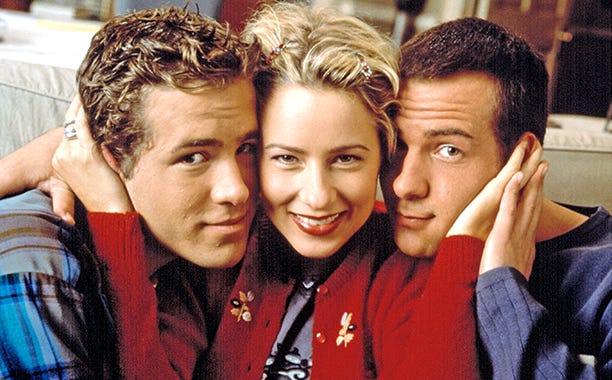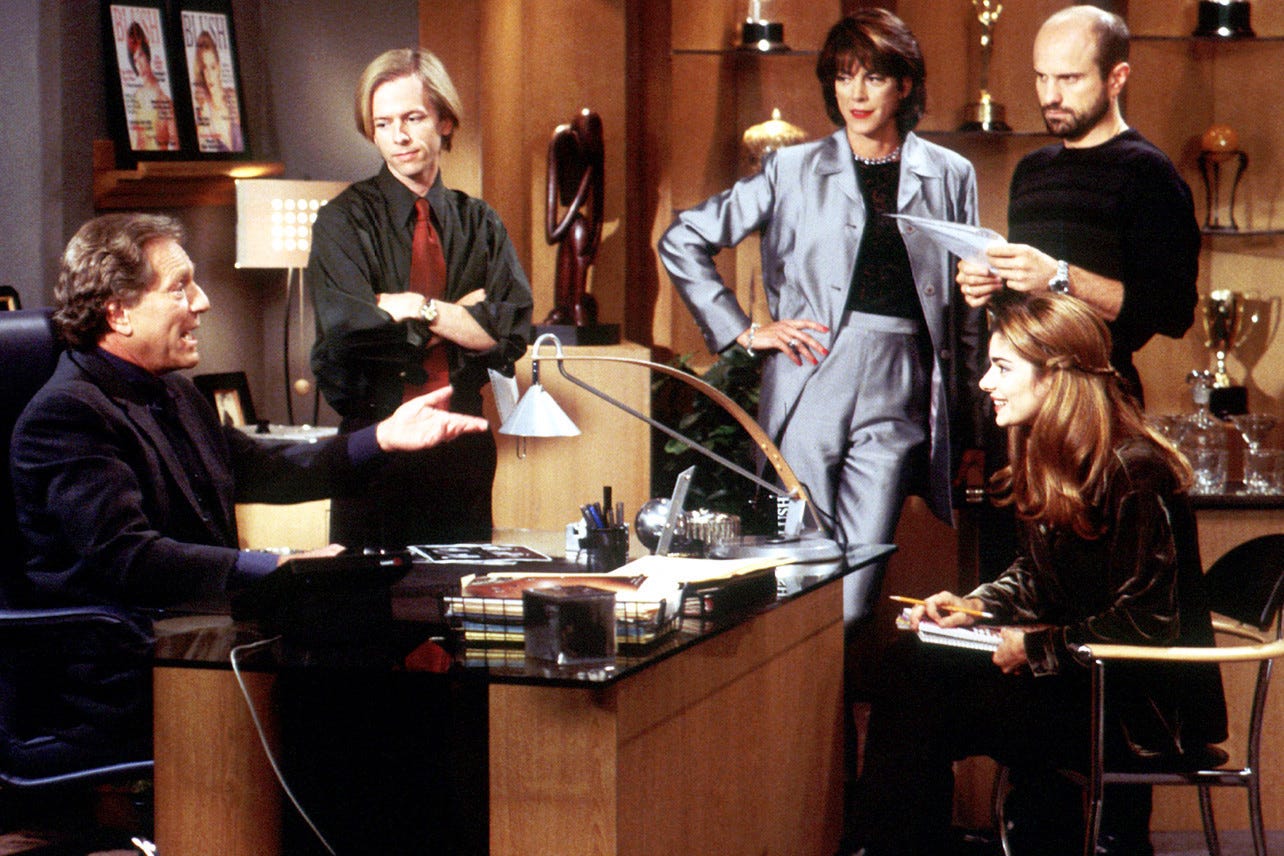When These Four 90s Sitcoms Hit Their Flop Eras
Shows that dazzled us before they fizzled out.
A note from Patrick: Jen Heller (Rerun Rewind) is a sitcom-encyclopedia and she’ll be joining Feature Presentation to do what she does best. Everyone welcome Jen to the site!
The '90s were a golden age of sitcoms. Primetime shows like Seinfeld, Friends, and Frasier won countless awards and dominated water cooler conversations. Many of the great '90s sitcoms started out strong and remained consistently funny throughout their runs; others went downhill after a few seasons. Here are four '90s sitcoms that dazzled us in the beginning but eventually hit their flop eras and fizzled out like spent fireworks dropping back to earth.
When NewsRadio Lost Phil Hartman
Today, NewsRadio can probably be called a “cult classic.” During its original run, it didn’t exactly rake in the ratings, but in recent years, viewers and critics alike have acknowledged its unique brand of smart, zany comedy driven by an ensemble cast of brilliant comedic actors like David Foley, Stephen Root, Andy Dick, and Vicki Lewis.
The character who always stole the show was Bill McNeal, played by SNL alum, Phil Hartman. His sarcastic tone and nonchalant, amused attitude made already funny lines even funnier, and his commanding voice was perfect for the role of a veteran newscaster.
Sadly, shortly after the show’s fourth season wrapped up, Phil Hartman died tragically. The network was forced to decide whether or not to continue the show without its funniest character. They chose to continue, and Hartman’s longtime friend and fellow SNL alum, Jon Lovitz, took over as Max Lewis.
The first episode of season five found the gang grieving Bill’s death from a heart attack. It was a touching tribute to the late actor, but with Hartman gone and Lovitz not even coming close to filling his snarky shoes, the show was difficult to watch. Fortunately, the network spared us all any further discomfort by canceling the show after season five.
When Spin City Lost Michael J. Fox
Spin City took the workplace sitcom to a new level by following the antics of the mayor of New York City (Barry Bostwick) and his staff at City Hall, led by Michael J. Fox as Deputy Mayor Mike Flaherty. The show took a cue from Ally McBeal and infused some surreal elements, like musical numbers, dream sequences, and Rags, Carter’s ancient suicidal dog who occasionally talked. With each new season, the edgy comedy continued to push the envelope and elevate standard gags with a new flavor.
Unfortunately, after season four, Michael J. Fox announced he was leaving the show. Having struggled with Parkinson’s disease for years, Fox felt he couldn’t continue acting full-time. It was a big blow to the series to lose its popular star. Most shows would probably wrap it up after that, but for some reason, Spin City went on for two more seasons with Charlie Sheen as Charlie Crawford in the deputy mayor’s seat.
While the writing was the same, watching Charlie Sheen deliver the jokes was just not as fun. The thing about Michael J. Fox is he’s extremely likable. You can’t help but like him. Try to not like him. Go ahead. I dare you. You can’t. But Charlie Sheen? It’s easy to not like him. His personal life aside, he doesn’t have Fox’s contagious energy and charm. He brought a whole new feel to the character that was off-putting instead of endearing.
Thanks to recent developments in Parkinson’s treatment, Michael J. Fox was able to return to television and even star in another sitcom, The Michael J. Fox Show, in 2013. I think I speak for everyone when I say we’re glad to see he’s doing better.
When Two Guys, a Girl, and a Pizza Place Lost the Pizza Place
The wordy title of Two Guys, a Girl, and a Pizza Place basically summed up the simple premise: two guys and a girl hang around a pizza place. But don’t let the seeming simplicity fool you. This show had a lot going for it, like incredibly funny actors, likable characters, and a catchy theme song reminiscent of The Violent Femmes’ “Blister in the Sun.”
Richard Ruccolo and Ryan Reynolds play roommates Pete and Berg, two single guys who work at a pizza place while attending grad school and figuring out the rest of their lives. Pete is an aspiring architect and Berg is in medical school. Their friend, single girl Sharon (Traylor Howard), lives upstairs and has a high-paying but soul-crushing job working for a heartless chemical corporation. The interplay of the three different characters and their journeys to find love and themselves provided ripe fodder for sitcom gags punctuated by Julius Carry as Bill, Pete and Berg’s longsuffering boss at the pizza place, and David Ogden Stiers as Mr. Bauer, a delusional customer who thinks movies are real life.
In season two, the writers decided to throw all that out the window and commit one of the gravest sitcom sins: messing with the status quo. They started by getting rid of Bill and Mr. Bauer, two funny side characters who added different perspectives to the show. Then Pete gave up architecture and Sharon quit her job, which completely changed the lives of both characters. Then Berg got an on-again, off-again girlfriend named Ashley (Suzanne Cryer), Sharon got a steady boyfriend named Johnny (Nathan Fillion), and Pete decided he was in love with Sharon, which totally warped the original dynamic of the three single best friends. So to recap, we now have three guys, two girls, a love triangle, and a pizza place. This once-simple sitcom is starting to sound more like a soap opera.
By season three, they got rid of the pizza place and re-named the show Two Guys and a Girl, which sounds more like a porno than a sitcom. By this point, the show got a bit busy, and the simple premise transformed into something convoluted with revolving girlfriends and constantly changing jobs and aspirations. The characters were confused, the writers were confused, and the viewers were confused. Somehow the show managed to struggle for one more season before it was finally put out of its misery due to dwindling ratings.
When Just Shoot Me! Lost Its Heart
Just Shoot Me! was a scrappy little sitcom that fought hard to compete with the primetime royalty of the mid-to-late-'90s. It starred an ensemble cast of comedy pros: George Segal, Laura San Giacomo, David Spade, Wendie Malick, and Enrico Colantoni. The dynamic of Maya (Laura San Giacomo), the intellectual liberal feminist working among the superficial, self-absorbed staff of a beauty magazine produced fish-out-of-water comedy gold for five straight seasons before the show suddenly and inexplicably took a turn into unfunny territory.
In season six, the feel of the show changed. The characters were different. They were meaner and angrier, exploding at each other at the drop of a hat, and they were dumber, as if their collective IQ had suddenly dropped several points. David Spade’s usual shtick as Dennis Finch became overly exaggerated and tedious. The writers rehashed previously used jokes and plotlines as if they had run out of ideas and just started re-purposing old episodes, and they filled in the gaps with tasteless sex jokes.
But the most noticeable difference was that the show no longer had a heart. Throughout the first five seasons, the characters often had touching moments where they learned lessons and grew emotionally. The silly comedy was grounded in friendship, love, forgiveness, and compassion. After season five, all that disappeared. The few attempts at any semblance of heart were brief and shallow and didn’t prompt any growth. It was as if the characters had regressed into horny toddlers. You could say the show left its heart in season five.
In season seven, the network made a last-ditch attempt to boost the show’s terminal ratings by shoehorning in a new character, Vicki, played by Rena Sofer. This strategy backfired (as it almost always does), the ratings continued to dive, and Vicki was quietly written out of the show after a mid-season hiatus.
In an unusual move, the network aired a couple more episodes sporadically out of order over the next few months but held back three, leaving whoever was still watching confused. These three episodes never aired until the show was in syndication. Series creator, Steven Levitan, blamed the network’s lack of promotion for the final season’s dismal ratings, but as a loyal fan during the show’s original run, I have to disagree. I tuned out when Vicki showed up. Sorry, Steve.








